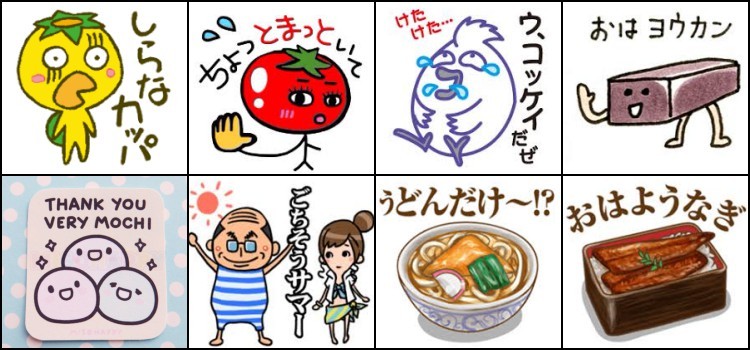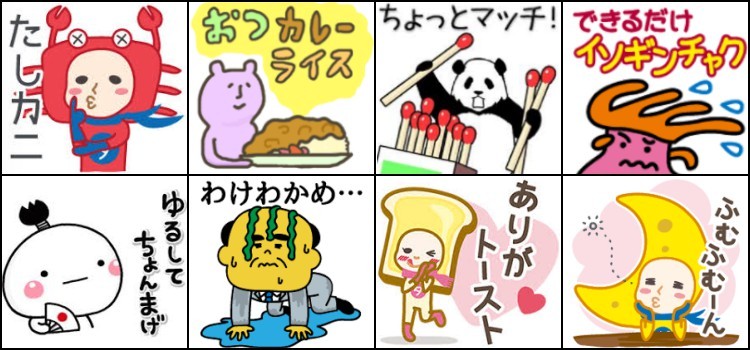There are different types of puns and word games. In the Japanese language, this is even greater due to the numerous expressions and various ways to read a kanji. Bad puns in Japanese are called dajare (駄洒落), which can also mean weak joke. Learning these bad Japanese puns, in addition to making you laugh, can help you improve the range of your language skills.
A pun can be a play on words or the act of combining words. There is even another expression called goroawase (語呂合わせ) which means to rhyme, play with words, and also pun. This word is a combination of the ideograms for word (語), spine (呂), and the verb to combine (合わせ). There is also another term to refer to puns and word games, which is kotobaasobi (言葉遊び), literally meaning word play.
In English, bad puns usually explore similar sounds or words, and sometimes the same words that have different meanings. In Japanese there are thousands of puns involving the same words, as the Japanese language has few syllables compared to other languages.
The amount of linguistic and written ambiguities available to Japanese speakers permitem create different types of puns and games involving words that we never imagined before. In this article, we will prioritize bad puns (dajare). We will also leave some images with other strips that you should try to understand by yourself. xD

Table of Content
Bad Japanese Puns - So bad it's good
Sometimes we don't see much fun in Japanese puns due to the language difference. Our rhymes and jokes are quite different, in the Japanese language it seems more like a word game. Let's see if you'll be able to understand the puns below:
- パンダの好きな食べ物は何ですか?
- Panda no sukina tabemono wa nandesu ka?
- What is a panda's favorite food?
- Reply - パンだ!- pan-da! (Bread)
The first pun is quite similar to Brazilian puns. We ask a question where the answer rhymes or is the same as the question! PAN in Japanese means bread, and we use DA as an affirmation similar to the verb desu (です).
- 先生:「I'm going to Tokyo」を過去形にしなさい。/ 学生:「I'm going to Edo」
- Sensei: Please make it into the right shape. Gakusei: (...);
- Teacher: Paste the phrase "I'm going to Tokyo" / Student: I'm going to Edo.
In English class, the teacher asks a student to put the phrase I'm going to Tokyo in the past tense. He replies I'm going to Edo which is the old name of Tokyo in past centuries. It's not a pun involving the Japanese language, but it involves Japan and yet another language!
- 禁煙なんて簡単だよ。私はもう100回はやったね
- Kin'en nante kantanda yo. Watashi wa mou hyakukai hayatta ne
- To stop smoking is easy, I did it about 100 times.
This pun doesn't even need an explanation! In addition to working perfectly in English!
- アルミ缶の上にあるみかん
- arumi kan no ue ni aru mikan
- A tangerine in an aluminum can;
Arumi kan means aluminum can, while mikan means tangerine.
- Hey, are you taking a proper bath? / Do you shower regularly?
- can be confused with
- Nee-chan, are you in the bathtub? / Do you shower with your sister?

Puns involving similar words
There are thousands of bad puns in Japanese involving the same words, let's see a few below:
- イルカがいるか
- iruka ga iruka?
- Are there dolphins?
Both the word dolphin and the question does it exist? is iruka. The only difference is in the writing of the word dolphin, which is in katakana.
- スキーが好き
- suki ga suki
- I like to ski
The same thing happens with the word skiing and liking, which are the same.
- 布団がお山の方まで吹っ飛んだ。おや、まあ!
- Futon ga oyama no kata made futtonda. Oya, maa!
- Flew to the side of the mountain. Oh gosh!
Another example of similar words in a sentence. This time the thing went further and used 2 puns in just one.
- パン 作ったくことある?
- Pan tsukutta koto aru
- Have you ever made bread?
If you write without kanji, or in the case of mentioning this question in a conversation, the person might understand: パンツ食ったことある? which means have you ever eaten panties?
- 虫は無視する
- Mushi wa mushi suru
- ignore the insect
Other puns involving Japanese
If you study Japanese, you probably have already invented or found a bad pun in facebook groups or social networks involving Japanese and Portuguese languages. The Japanese phonemes are very similar to the Portuguese ones, so several Japanese words end up resembling some funny Portuguese word, thus creating several bad puns.
A famous group for doing this is the Nihongo o benkyō suru hōhō! If you want to take a look, you will die laughing! I hope you enjoyed this article. Do you know any other bad puns involving the Japanese language? Leave a comment and share with your friends! Read other articles below:
